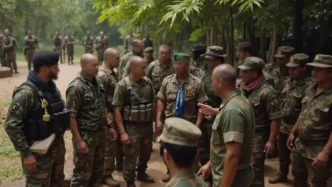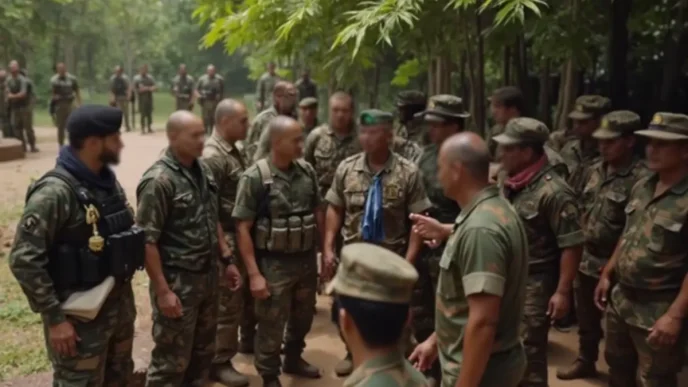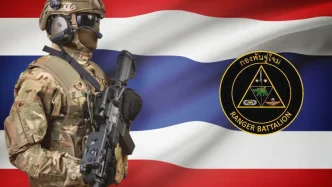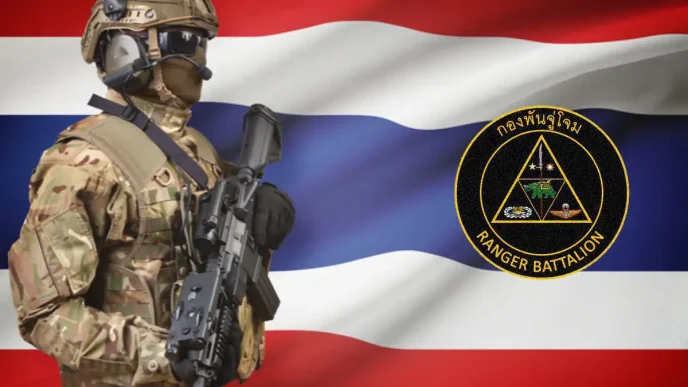Two Bangladeshi fishermen were shot and injured by members of an alleged armed rebel group from Myanmar, according to local authorities, in a violent encounter near the volatile border between the two nations. The incident, which occurred in the waters off Rakhine State, has reignited concerns over cross-border tensions and the plight of vulnerable communities caught in the region’s ongoing conflicts.
Details of the Attack
The fishermen, identified as Mohammad Ismail, 35, and Abdul Karim, 28, both from Cox’s Bazar in southern Bangladesh, were attacked while fishing near the Naf River, which marks the border between Bangladesh and Myanmar’s Rakhine State. Local police reported that the assailants, believed to be members of a Myanmar-based armed group, opened fire on the fishermen’s boat early on a recent morning. Ismail sustained a gunshot wound to the shoulder, while Karim was hit in the leg. Both men were rushed to a nearby hospital and are said to be in stable condition.
A spokesperson for the Border Guard Bangladesh (BGB) stated that the attackers fled back into Myanmar territory following the incident. “We have lodged a formal protest with the Myanmar border authorities and are seeking an explanation for this unprovoked act of violence” said the spokesperson. The identity of the armed group remains unclear, though speculation points to factions operating in Rakhine State, a region long plagued by ethnic conflict and insurgency.
Context of Rakhine State’s Instability
Rakhine State, located in western Myanmar, has been a hotspot of violence for decades, marked by clashes between the Myanmar military, known as the Tatmadaw, and various ethnic armed organizations, including the Arakan Army (AA). The region is also infamous for the 2017 military crackdown on the Rohingya Muslim minority, which led to mass displacement and accusations of genocide. Hundreds of thousands of Rohingya fled to neighboring Bangladesh, many settling in sprawling refugee camps near Cox’s Bazar, close to where the fishermen were attacked.
While the Arakan Army, which seeks greater autonomy for the ethnic Rakhine population, has denied involvement in the shooting, local sources suggest that smaller, less organized factions may be responsible. These groups often operate in the border areas, exploiting the lawlessness of the region for smuggling, trafficking, and other illicit activities. Fishermen, who rely on the Naf River and the Bay of Bengal for their livelihoods, are frequently caught in the crossfire of such disputes.
The border between Bangladesh and Myanmar remains porous and poorly policed, with frequent reports of skirmishes, abductions, and shootings. For communities on both sides, the constant threat of violence compounds the challenges of poverty and limited access to resources. “We just want to fish in peace, but every day we risk our lives” said a fellow fisherman from Cox’s Bazar, speaking on condition of anonymity due to fear of reprisals.
Impact on Bangladeshi Fishing Communities
The fishing communities of Cox’s Bazar, already struggling with overfishing, climate change, and economic hardship, now face an additional layer of danger from cross-border violence. Many fishermen report being harassed or extorted by armed groups operating out of Myanmar, with some forced to pay bribes to avoid confrontation. The recent shooting has heightened fears, with several families urging their loved ones to abandon fishing altogether despite the lack of alternative livelihoods.
Local authorities estimate that fishing contributes significantly to the economy of coastal Bangladesh, supporting tens of thousands of families. However, incidents like this one threaten to disrupt the industry further. “If this continues, we will lose everything” said a community leader in Cox’s Bazar. “The government must do more to protect us.”
Bangladesh has repeatedly called on Myanmar to rein in armed groups operating near the border, but the political instability in Myanmar following the 2021 military coup has complicated diplomatic efforts. With the Myanmar junta focused on suppressing internal dissent and battling resistance forces across the country, border security appears to be a low priority for Naypyidaw.
International and Regional Implications
The shooting of the Bangladeshi fishermen underscores the broader regional challenges posed by Myanmar’s ongoing crisis. Since the military coup in February 2021, which ousted the democratically elected government of Aung San Suu Kyi, Myanmar has descended into chaos, with widespread violence and a deepening humanitarian crisis. Neighboring countries, including Bangladesh, Thailand, and India, have struggled to manage the spillover effects, from refugee inflows to cross-border crime.
Bangladesh, already hosting nearly a million Rohingya refugees, is particularly vulnerable to instability in Myanmar. The government in Dhaka has expressed frustration over the lack of progress in repatriating the Rohingya, a process stalled by continued violence in Rakhine State. Incidents like the recent shooting only deepen the mistrust between the two nations, making cooperation on border security and refugee issues even more difficult.
Analysts warn that without a coordinated regional response, such incidents could escalate into larger conflicts. “The border areas are a tinderbox” said Dr. Ayesha Rahman, a South Asia security expert based in Dhaka. “Small incidents like this can quickly spiral if not addressed through dialogue and joint action.” She emphasized the need for international mediation, potentially through bodies like the Association of Southeast Asian Nations (ASEAN), though ASEAN’s efforts to resolve the Myanmar crisis have so far yielded little result.
Human Cost of Border Violence
Beyond the geopolitical ramifications, the human cost of such violence is profound. Mohammad Ismail and Abdul Karim, the injured fishermen, are sole breadwinners for their families. Their injuries mean weeks, if not months, of lost income, with no clear mechanism for compensation or justice. “I don’t know how we will survive” said Ismail’s wife, speaking to local media outside the hospital where her husband is being treated. “We have children to feed, and now he cannot work.”
Stories like theirs are all too common in the border regions, where ordinary people bear the brunt of conflicts they have little control over. Humanitarian organizations have called for greater protection for civilians in these areas, including the establishment of safe zones for fishing and trade. However, implementing such measures requires cooperation between Bangladesh and Myanmar, a prospect that remains elusive given the current political climate.
Looking Ahead
As investigations into the shooting continue, questions linger about how to prevent similar incidents in the future. Bangladesh has vowed to strengthen border patrols, but resources are stretched thin, and the rugged terrain of the Naf River makes enforcement challenging. Meanwhile, the lack of accountability for armed groups in Myanmar raises doubts about whether justice will be served for Ismail and Karim.
For now, the fishermen of Cox’s Bazar are left to navigate an increasingly dangerous reality, caught between the need to earn a living and the ever-present risk of violence. As one local put it, “The sea is our life, but it is also our fear.” With no immediate resolution to the conflicts in Rakhine State, the border remains a perilous frontier for those who call it home.
















